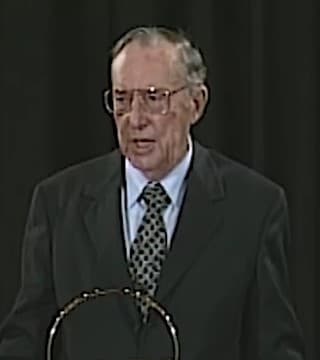Derek Prince - Why Fasting Is Fundamental To The Life Of The Church (04/18/2022)
This is a clip from the full sermon: Self-Humbling Through Fasting
All right, we’re going to go to the New Testament. A lot of people say, "Oh, that was Old Testament. That’s the kind of thing they did in the Old Testament". Brothers and sisters, you’re mistaken. The number one example of fasting in the New Testament is who? Jesus. Let’s turn to Luke 4:1. This is the beginning of the public ministry of Jesus. Then Jesus, being filled with the Holy Spirit, returned from the Jordan and was led by the Spirit into the wilderness, being tempted for forty days by the devil. And in those days He ate nothing, and afterward, when they had ended, He was hungry. That is occasionally a truth, that you can fast for a period and not be hungry, but when the fast is over that’s when you become hungry. But that was the beginning of the ministry of Jesus. He did nothing in public ministry until He had spent forty days in prayer and fasting seeking God.
And it says in verse 1 of chapter 4, "Jesus being filled with the Holy Spirit..." But if you read the end of that period of fasting in verse 14, it says, "Then Jesus returned in the power of the Holy Spirit..." I want you to know there’s a difference. It’s one thing to be filled with the Holy Spirit. It’s another thing to minister in the power of the Holy Spirit. What bridged the gap? Fasting and prayer. Lots of Christians that are filled with the Spirit but they don’t have much power. Because they have not subdued the old opposing ego within them. The scriptural way to do that is by fasting and prayer.
Now when Jesus taught, and of course the Sermon on the Mount is the main passage we look to, He used the word 'when' three times. In verse 2 of Matthew chapter 6 he said, "When you do your charitable deeds". He didn’t say "if" you do but "when". He took it for granted they would do them. In verse 5 He says, "When you pray", not 'if' you pray but when. And in verse 16 He said, "When you fast". Not if you fast, but when. He put fasting on exactly the same level with charitable deeds and prayer. And He assumed that all His disciples would do all three. You remember I spoke earlier about the difference between being a disciple and a church member? This is one of the dividing lines. Disciples practice fasting. Church members may or may not.
And then we look in the Book of Acts at the principles that guided the church in its early days. We turn to Acts 13. This is generally called the first sending out of missionaries, although they didn’t use the word missionaries, they used the word apostles. It is an absolute turning point in the whole history of the church. And it says in verse 1: Now in the church that was at Antioch there were certain prophets and teachers: Barnabas, Simeon who was called Niger, Lucius of Cyrene, Manaen who had been brought up with Herod the tetrarch, and Saul [who later became Paul] . As they ministered to the Lord and fasted, the Holy Spirit said, "Now separate to Me Barnabas and Saul for the work to which I have called them".
So ministering to the Lord for those church leaders who are prophets and teachers included fasting. I believe, though I am not sure, that the NIV says "as they worshiped the Lord". Is that right? So you see worshiping includes fasting. So don’t tell me you’re a worshiper if you never fast. That’s the Scriptural pattern. So they got the revelation of the mind of the Lord, "You’ve got to send out Barnabas and Saul". Then they fasted again please note. It goes on in verse 3: Then, having fasted and prayed, and laid hands on them, they sent them away. So they fasted and prayed twice. Once to get the mind of the Lord. The second time to equip and empower the two who were sent out.
Now you read on into Acts 14:23 the consummation of their first missionary journey in their dealings are they established churches. And let me say, a group of people without elders is not a church. It’s elders that make a church, if they’re the right elders. So it says in verse 23: So when they had appointed elders in every church, and prayed with fasting, they commended them to the Lord in whom they had believed. So the two vital decisive moves in the development of the church, the sending out of apostles or missionaries, and the appointing of elders or leaders in the local church were both done with prayer and fasting. They are fundamental to the life of the church.

